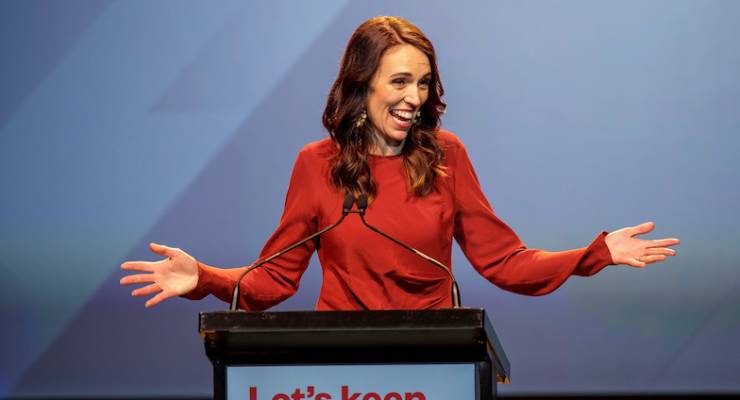
Jacindamania strikes again. On Saturday, New Zealand’s Prime Minister Jacinda Ardern led her Labour Party to its greatest election victory in over 50 years, one that offers some clear lessons to politicians on this side of the Tasman.
First: keeping your citizens safe during a pandemic is a major vote winner. Immediately before COVID-19 struck, the NZ Labour Party led the National Party 42.5% to 37%. The election landslide saw Labour triumph 49% to 27%. In other words, the gap widened from 5.5% pre-COVID to a remarkable 22% by election day. That was despite the New Zealand economy contracting by a frightening 12% in the June quarter.
The determination of the premiers of Queensland and Western Australia to keep their borders shut shows that they recognise the huge electoral benefits of controlling the disease. President Donald Trump either never had that realisation or decided that it was all too hard in the land of the free.
The second lesson is that, in modern politics, nothing beats charisma and celebrity.
Jacinda Ardern is a political star of the first order, almost as well recognised internationally as she is at home. Known to her legion of fans as “St Jacinda” and “the anti-Trump” (and to her detractors as “Jaspinda”), Arden typifies modern presidential-style politics where the party leader is central to the party’s electoral prospects.
Ardern’s stratospheric personal popularity was crucial to Labour’s success. It swept all before it in the election campaign. Most significantly, it transcended mundane issues like policies. One can only sympathise with Ardern’s opponent Judith Collins.
Of course, it’s one thing to understand this lesson but quite another to follow it. Charismatic celebrities like Ardern are thin on the ground.
And what does a political party do if its leader isn’t a charismatic celebrity, or at least a popular and engaging individual with some kind of X-factor? Change the leader?
That’s where the third lesson from the land of the long white cloud comes in: changing leaders is fraught with danger. Judith Collins was the third leader of the National Party in less than six months. There were numerous rumours of division within the party and she has already identified the leaking of damaging internal party documents as a contributing factor in her loss. Disunity is death in party politics.
This lesson would not come as a surprise to either the ALP or the Coalition. However, given their proclivity for dispatching leaders, they could probably both do with another reminder.
The harsh reality is that it’s practically impossible to reconcile lessons two and three. If a party needs both to have a “star” leader and to avoid disunity, the only solution is to identify future stars early in their careers and to engineer their smooth flightpath to eventual leadership.
There are two problems with this. First, it is not always easy to identify future stars. (The attributes that have made Ardern a star were not obvious early in her career. She stood twice for the seat of Central Auckland and failed to win.) Secondly, party politics do not lend themselves to long-term leadership planning. They are far too random and messy, driven by self-serving ambition and factional interests.
The fourth lesson from the New Zealand election is that dramatic changes to the political landscape can occur very quickly. It was not that many years ago that the National Party’s John Key reigned supreme. If not charismatic in the traditional sense, he was nevertheless upbeat and exuded stability and competence. It’s been less than four years since Key’s departure, yet on Saturday his party barely won a quarter of the votes.
What do these lessons tell us about federal politics in Australia? In terms of leadership, neither Morrison nor Anthony Albanese have the communication skills or personal empathy of Ardern, let alone her international recognition. But Morrison has the benefit of incumbency. He’s in front of the nation constantly and has developed an easygoing confidence. Albanese has an unenviable task. There is little for an opposition leader to do during a national crisis.
In terms of party unity, the Liberal Party looks more stable than at any time since John Howard was in charge. The same cannot be said of its coalition with the Nationals. Meanwhile, the ALP appears susceptible to division on environmental issues.
The good news for Labor is that the next election is still at least a year away, and a year in politics is an eternity. All sorts of dangers lurk for the government, from a worse-than-expected economic downturn to a major deterioration in relations with China, from another outbreak of COVID-19 to another outbreak of Barnaby Joyce.








How to sum up the differences between Ardern and Morrison in a sentence? One steps up to challenges, the other goes on an secret Hawaiian holiday. Done.
It really is that simple. Honest & straightforward.
VERY shallow assessment. The most important element of Ardern’s win, apparently, was her charisma and international recognition and reputation. Possibly, but the real question is why she has these attributes. Charisma is partly intrinsic, but the perception of the charisma is as much to do with the receptiveness of the audience to the brand being displayed. This is where the real difference between her and Morrison, Trump etc lies (haven’t made up my mind about Albo yet). She gets her following and her international reputation because she displays Leadership and because she clearly understands that leadership requires bringing people along by bringing them together.
Insightful comment and one would add, how do the media compare in NZ and Australia in informing their respective electorates?
Exactly. Charisma alone is not enough. She is genuinely empathic and it shows in her leadership.
The ALP needs a charismatic, competent, empathetic female leader. We just don’t need another old white guy.
They had one, but one bloke opposite her and one bloke “behind” her unintentionally cooperated on their shared goal to remove her.
Ain’t that the truth!
Curse them both and the mob that tolerated them
I would not say male or female. Just the charismatic, competent, emphatic plus fair would do me.
I’ve got to say I agree! If the policy, attitude and empathy is there I don’t care about gender.
Why do Australians fail to believe that leadership is a good trait in politics. The word leadership was used in a party political sense three times in this article, but not once as a quality that Ms Ardern possesses. It wasn’t celebrity or charisma that made her actions after the Christchurch massacre stand out, it was her leadership. It was also her leadership that helped New Zealand to get through a pandemic (so far) and accept the economic consequences for a hard lockdown. She earned and deserved the win – not because of her charisma or alleged celebrity, but because she showed her country that increasingly rare quality of true leadership. If there was a lesson to be learned from this election win, I suspect the author of this article didn’t learn it.
that’s a good point you make, i found the same oddly warped concept of leadership being applied to Trump up until quite recently….where he was being given a gold star rating on his handling of the US economy up until the outbreak, then a bit of a free pass for the negative economic effects caused by Covid and lockdowns – because, “who could have seen that coming?” But it is in these very moments, when circumstances throw you a curve ball, that the qualities of a real leader come to the fore – qualities like courage, resourcefulness, and the ability to bring the full power of a nation together, working for a common goal. So the disastrous effects of Covid on life in the US, economy included, is 100% the fault of Trump, who, when confronted with a moment that called for true leadership, failed utterly. In Australia, i reckon the general view of what makes a “real” leader is still a pretty retrograde one revolving around being macho, miserly, aggressive, and constantly obsessed with profits and reining in spending. These are the real metrics that matter, as far as a large chunk of the general public are concerned. Anything that’s not hairy chested gets ridiculed. Before we can have a kinder, happier and more sustainable society we need to somehow reframe the deep rooted feeling that many australians have, that being a hard-headed conservative who knows the cost of everything and the value of nothing, is the only way to be a leader. Hopefully Jacinda can show us.
Hear hear the lady is popular for valid reasons!
Ditto on the hear, hear.
Couldn’t agree more Kevin, and couldn’t disagree more with a regular poster who suggested she was just ‘a personality’. Vacuous analysis bereft of analysis, heavy on the old white male misogyny. Ardern has been a standout world leader in troubled times.
“In terms of party unity, the Liberal Party looks more stable than at any at any time since John Howard was in charge. Meanwhile, the ALP appears susceptible to division on environmental issues.” The coalition is not susceptible to division? Canavan? Kelly? Abetz? Eh?
Steady as she goes Fraudie, keep her aimed at that iceberg…..
I would suggest the Coalition is very fragile, with particular Nationals going rogue every so often. The only reason the Coalition survives, is that it is the only way that the Liberal Party can ever form a Government. It needs the Nationals to make up the numbers to beat Labor. And as far as the Liberal Party being stable, I think that must be some sort of joke. If they had lost the last Election, Morrison would have been gone.
It should be easy to have stability when you’re in Power but both Labor and Liberals proved that assumption incorrect, with Labor going Rudd/Gillard/Rudd, and then the Liberals going Abbott/Turnbull/Morrison.